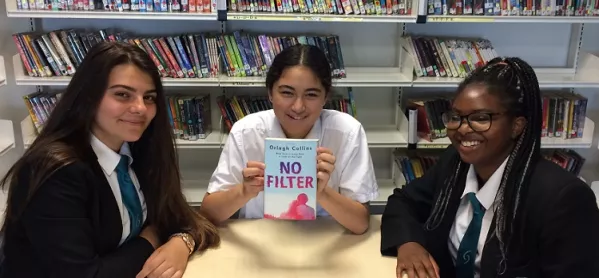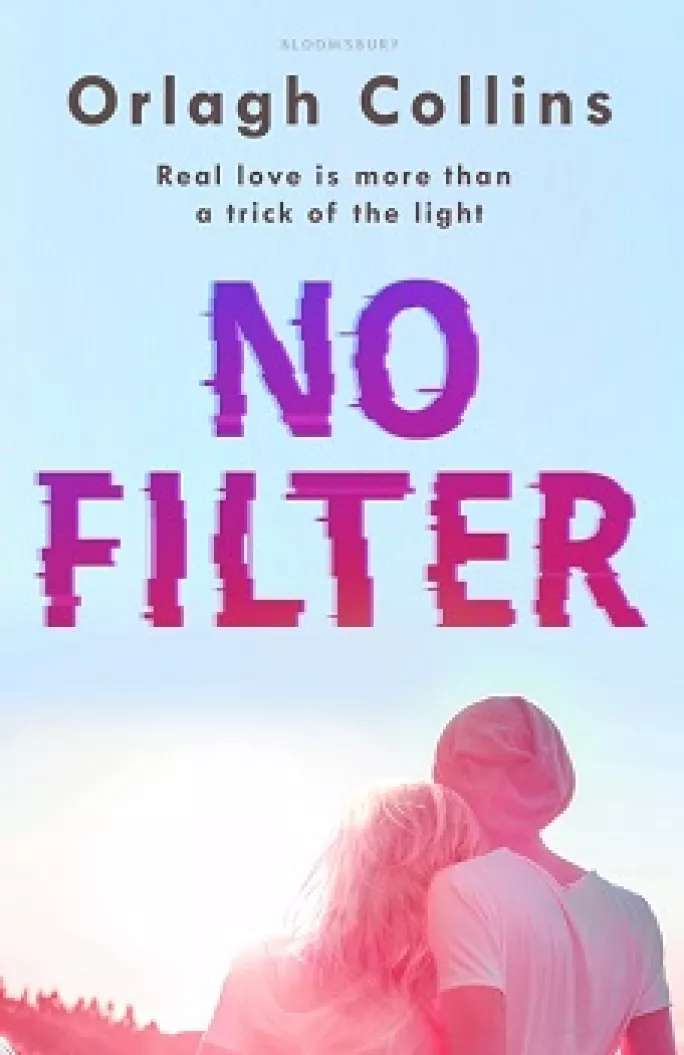- Home
- The class book review: ‘Her family is keeping a secret that will tear them apart. Obviously’
The class book review: ‘Her family is keeping a secret that will tear them apart. Obviously’

Title: No Filter
Author: Orlagh Collins
Publisher: Bloomsbury Children’s
Teacher review
No Filter, the first novel by Irish writer Orlagh Collins, should satisfy readers who like their teenage romance slushy, conventional and idealistic.
The story is told in alternate points of view from the two main characters, Emerald (Em) and Liam. Sixteen-year-old Em enjoys a hectic social life, thanks to her swanky boarding school in the West Country. Every soaring success or disastrous failure is captured on camera and scrutinised on her Instagram account, where the number of ‘likes’ can make or break her day. She is completely addicted to social media - while her mother is addicted to tranquillizers and alcohol.
When Mum takes an overdose and is forced into rehab, Em is sent to stay with her grandmother in Dublin, where she secretly hooks up with ambitious, hard-working Liam. Gradually, her beloved phone starts to lose its power over her. And, while the camera may never lie, Em is becoming an adept fibber, withholding different truths from nearly every single person around her, as she carves out a new life in Ireland. It turns out she’s not the only person in her family telling porkies; when the biggest cover-up of all comes out it will have far-reaching consequences for everyone.
Liam, meanwhile, is keeping some of his own secrets, including one that could destroy his relationship with his parents and Emerald.
No Filter is a pleasant enough story, but we did wonder whether it has enough of a USP to hold its own in the crowded and dramatic YA market. The whole living-life-through-social-media element is nicely done, and definitely helps form a theme to the story, but the secrets-and-lies/parents-as-addicts storylines have been pretty much covered in other novels. The two main characters aren’t that memorable. Liam’s voice in particular is strangely unconvincing, while the narrative itself is clichéd and gushy: “The most unflattering photo EVER literally leaps up at me” is a typical Emerald statement.
Natalia Marshall is manager of the learning resource centre at The Compton School, North London.
Pupil reviews
‘My heart fluttered at the clichés’
The whole book screams summer romance, from the candyfloss-coloured cover to the inevitable teenage love story to come. This is a tale about finding happiness and viewing life for what it is, no filters necessary.
First person is used throughout, and that makes me feel like I am the character. Collins successfully conveys all emotions from happiness to sadness, making it easy to lose myself in her characters and form a connection with them. Even though the book is full of too-good-to-be-true clichés, the development of Emerald and Liam’s love is told in such a way that my heart fluttered continuously whenever these clichés appeared, though they are quite subtle and applied in such a way that they couldn’t be depicted as too cheesy but just right.
The only negative thing I could say about the book is that it is highly unrealistic - the couple are able to maintain a long-distance relationship as teenagers. I think that what takes place in Ireland wouldn’t have taken place in reality. For me, it felt as if the storyline was quite easy to guess and there were no major plot twists, though this could also be viewed as a good thing, as there were no situations where the characters could unnecessarily overreact, which is common in many YA books.
The character development is tremendous in this tale about first love. Emerald stops looking at life through a filter, stops viewing life through her phone and finally learns to live in the moment. And through Emerald, Liam gains confidence and is able to start doing the job he loves most, which would have been impossible without her.
Jessica Ahmed, Year 9
‘Soppy, everyone-has-a-happy-ending piece of fiction’
No Filter is about a girl named Emerald whose life is caught up with being popular, along with the shock of her mother trying to commit suicide. Her father ships her off to Ireland to her grandma, where she then, despite her cloud of depression, meets a gorgeous boy. Oh, what a surprise. He then, of course, has his own emotional baggage to bring with him, and her family is keeping a secret that will tear them apart. Obviously. And then it turns into a series of events that lead to a happy ending.
No Filter, in my opinion, is overall a terrible book. It’s a typical love at first sight, trying to appeal to teenage girls and keep up with the times, with use of the internet, the terrible influence of social media and sex, drugs and alcohol. It takes the life of an atypical teenage girl in the midst of secondary school and throws a load of drama into it, creating something that completely ignores all common sense and the life of an average female teenager.
The book, thankfully, gets slightly better near the end - if only because I like seeing the characters in misery - before turning back into a soppy, everyone-has-a-happy-ending piece of fiction. Not my kind of thing at all.
Maia Mandell, Year 9

‘One summer can change everything’

Overall, this book is aimed at younger teenagers, as they could have had some experience of what happened in their lives. It is relatable and shows you all about love and how sometimes it’s not always a good thing and can hold you back a bit.
The point of view of the book is quite romantic and I think for a girl reader it comes across as quite sweet, whereas for boys it could be an eye opener and show both sides of the story. It also shows how life can go downhill quickly, but people can be around to help, and also that you have to believe in yourself.
The book has a strong take on family problems, for example at the start where Emerald’s mum is taken to hospital then goes to the “best place” possible, the rehab facility. So Em has to go and live with her grandma, who she hasn’t spoken to for years for some mysterious reason, and finds out that a different lifestyle can actually be beneficial.
It shows how just one summer can change everything, including your closest friendships, and therefore you should treasure every moment and as you never know what could happen.
Emerald and Liam are the perfect summer couple who dare to dream and think outside the box. But I did wonder what would happen long-term, when Em has to go back home and leave Liam behind.
Amanda Rushta, Year 9
‘Seemed to drag in parts’
On the whole, I found this novel was readable, but it seemed to drag in parts. I didn’t find the story very believable, and being in a long-distance relationship at that age seemed too good to be true. I couldn’t really relate to the whole Instagram thing, because I don’t know anyone who is addicted like Emerald is, but I expect there are people who are like that.
I enjoyed reading Liam’s side of things more because it was more realistic and down to earth than Emerald, who I found to be not very memorable as a character. I liked that it was set in a different place and it was good to read about a different setting. But Liam seemed to spend too much time talking about Emerald, which I don’t think would happen in real life.
The part where the dad’s business corruption was exposed was shocking and interesting, but it seemed too much of a coincidence and there was too much going on. It seems like the whole family had too much stuff to deal with, which drove the story forward, but was hard to take in. As a reader, I felt a bit bombarded.
I also found the beginning quite confusing and I had to reread it several times to understand what was going on. The ending was happy, but in real life there would probably have been a lot more awkwardness, and it’s not like they had been together for long. I think I’d have found it more believable if, for instance, the ending had been less happy - for example with them not getting back together and just seeing their romance as a happy memory of a lovely summer.
Timera Whittaker, Year 9
If you or your class would like to write a review for Tes, please contact Adi Bloom at adi.bloom@tesglobal.com
Want to keep up with the latest education news and opinion? Follow Tes on Twitter and like Tes on Facebook
Keep reading for just £1 per month
You've reached your limit of free articles this month. Subscribe for £1 per month for three months and get:
- Unlimited access to all Tes magazine content
- Exclusive subscriber-only stories
- Award-winning email newsletters



